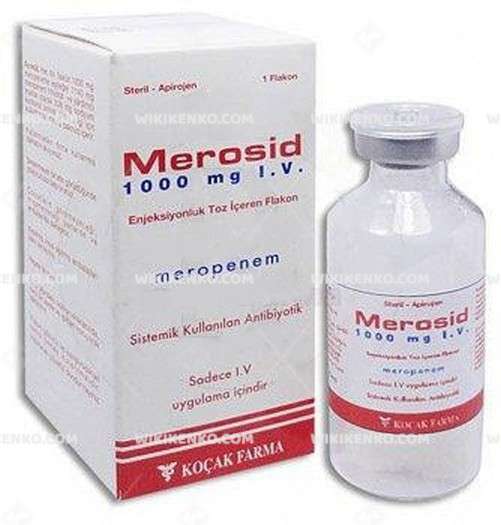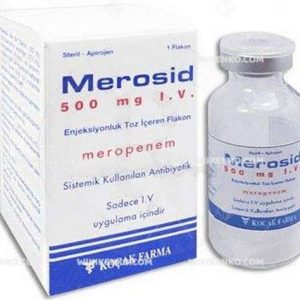Merosid I.V. Injection Powder Iceren Vial 1000 Mg
In the realm of antibiotics, Merosid I.V. Injection 1000 Mg shines as a formidable weapon against bacterial infections. This comprehensive guide delves into the nuances of Merosid, deciphering its composition, applications, administration, precautions, side effects, and considerations for pregnant women.
| Dosage form | |
|---|---|
| Pack size | |
| Potency | 1000 Mg |
| Manufacturer | |
| Origin | |
| Generic Name (Ingredient) | Meropenem Trihydrate 1140 Mg (Equivalent To 1000 Mg Meropenem) |
Assuming your emergency circumstances for this product, visit Urgent Quotation page. Besides, for any pharmaceutical questions, please ask us in the comments section.
Description
Composition
Merosid I.V. Injection 1000 Mg is a potent medication encapsulating the active ingredient meropenem, a carbapenem antibiotic. It is meticulously crafted as a white or light yellow sterile powder, stored within vials. Each vial houses 1000 mg of meropenem, equivalent to 1140 mg of meropenem trihydrate. The administration of this medication is intravenous, ensuring rapid and effective delivery to the body.
Bacterial Infections: Merosid’s Applications
Merosid emerges as a stalwart defender against a wide spectrum of bacterial infections, effectively halting bacterial growth. This versatile antibiotic finds its application in various scenarios, combating infections that threaten the body’s well-being. Merosid is employed in the treatment of:
- Pneumonia: Addressing infections that afflict the lungs.
- Bronchial and Respiratory Tract Infections in Cystic Fibrosis Patients: Offering relief to individuals battling cystic fibrosis-related infections.
- Complicated Urinary Tract Infections: Providing a robust defense against intricate urinary tract infections.
- Complicated Intra-abdominal Infections: Tackling complex infections within the abdominal region.
- Infections Acquired During or After Childbirth: Safeguarding the health of mothers and newborns.
- Complicated Skin and Soft Tissue Infections: Combating infections that affect the skin and underlying tissues.
- Acute Bacterial Meningitis: Shielding the brain from bacterial invasion.
Additionally, Merosid proves valuable in treating patients with fever characterized by low white blood cell counts and suspected bacterial infections.
Administration
Merosid’s effectiveness hinges on its intravenous administration, where it is injected directly into a vein. The dosage and duration of treatment are tailored to the specific infection, taking into account factors such as the patient’s age, weight, and overall health. This precision ensures the targeted action of the medication.
Precautions and Considerations
Before embarking on a Merosid regimen, several precautions merit attention. It is imperative to inform your healthcare provider of any allergies to the medication’s active or inactive ingredients. Additionally, if you have experienced allergic reactions to other antibiotics such as penicillins, beta-lactams, other carbapenems, or cephalosporins, this information is crucial.
Furthermore, individuals with pre-existing health conditions, particularly those concerning the liver or kidneys, should communicate this to their healthcare provider. These insights guide the safe and effective use of Merosid.
Side Effects
While Merosid, containing meropenem, is a potent weapon against infections, it may also introduce side effects. Common side effects may encompass rash, headache, vomiting, nausea, and injection site reactions, including pain, swelling, and redness. Less frequently encountered side effects include abdominal pain, diarrhea, inflammation, an increase in platelet count (thrombocytosis), and skin reactions.
It’s essential to note that not every individual will experience these side effects. If any side effects manifest while taking Merosid, promptly inform your healthcare provider. They will provide guidance on managing these effects and determine whether continuation of the medication is advisable.
Pregnancy
In pregnancy, caution is paramount. Merosid should not be utilized during pregnancy unless the potential benefits significantly outweigh potential risks to the fetus. Prior consultation with a healthcare provider is imperative to assess these risks and benefits comprehensively.
Conclusion
Merosid stands as a stalwart ally in the battle against bacterial infections. By grasping its composition, applications, administration, precautions, side effects, and considerations for pregnancy, individuals and healthcare providers can make informed decisions, safeguarding health and well-being in the face of bacterial challenges.
Use the form below to report an error
Please answer the questions as thoroughly and accurately as possible. Your answers will help us better understand what kind of mistakes happen, why and where they happen, and in the end the purpose is to build a better archive to guide researchers and professionals around the world.
The information on this page is not intended to be a substitute for professional medical advice, diagnosis, or treatment. always seek the advice for your physician or another qualified health provider with any questions you may have regarding a medical condition. Always remember to
- Ask your own doctor for medical advice.
- Names, brands, and dosage may differ between countries.
- When not feeling well, or experiencing side effects always contact your own doctor.
Cyberchondria
The truth is that when we’re sick, or worried about getting sick, the internet won’t help.
According to Wikipedia, cyberchondria is a mental disorder consisting in the desire to independently make a diagnosis based on the symptoms of diseases described on Internet sites.
Why you can't look for symptoms on the Internet
If diagnoses could be made simply from a textbook or an article on a website, we would all be doctors and treat ourselves. Nothing can replace the experience and knowledge of specially trained people. As in any field, in medicine there are unscrupulous specialists, differences of opinion, inaccurate diagnoses and incorrect test results.




Reviews
There are no reviews yet.